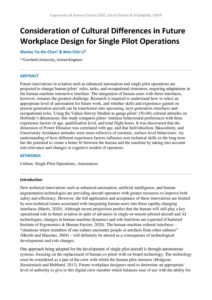| Document | Author Wesley Tsz-Kin Chan & Wen-Chin Li |
| Abstract Future innovations in aviation such as enhanced automation and single pilot operations are projected to change human pilots’ roles, tasks, and occupational structures, requiring adaptations in the human-machine interactive interface. The integration of human users with these interfaces, however, remains the greatest challenge. Research is required to understand how to select an appropriate level of automation for future work, and whether skills and experience gained on present generation aircraft can be transferred onto upcoming, next-generation interfaces and occupational roles. Using the Values Survey Module to gauge pilots’ (N=40) cultural attitudes on Hofstede’s dimensions, this study compares pilots’ intrinsic behavioural preferences with three experience factors of age, qualification level, and total flight hours. It was discovered that the dimension of Power Distance was correlated with age, and that Individualism, Masculinity, and Uncertainty Avoidance attitudes were more reflective of extrinsic, surface-level behaviours. An understanding of how different experience factors influence non-technical skills in the long term has the potential to create a better fit between the human and the machine by taking into account role-relevance and changes in cognitive models of operators. |

